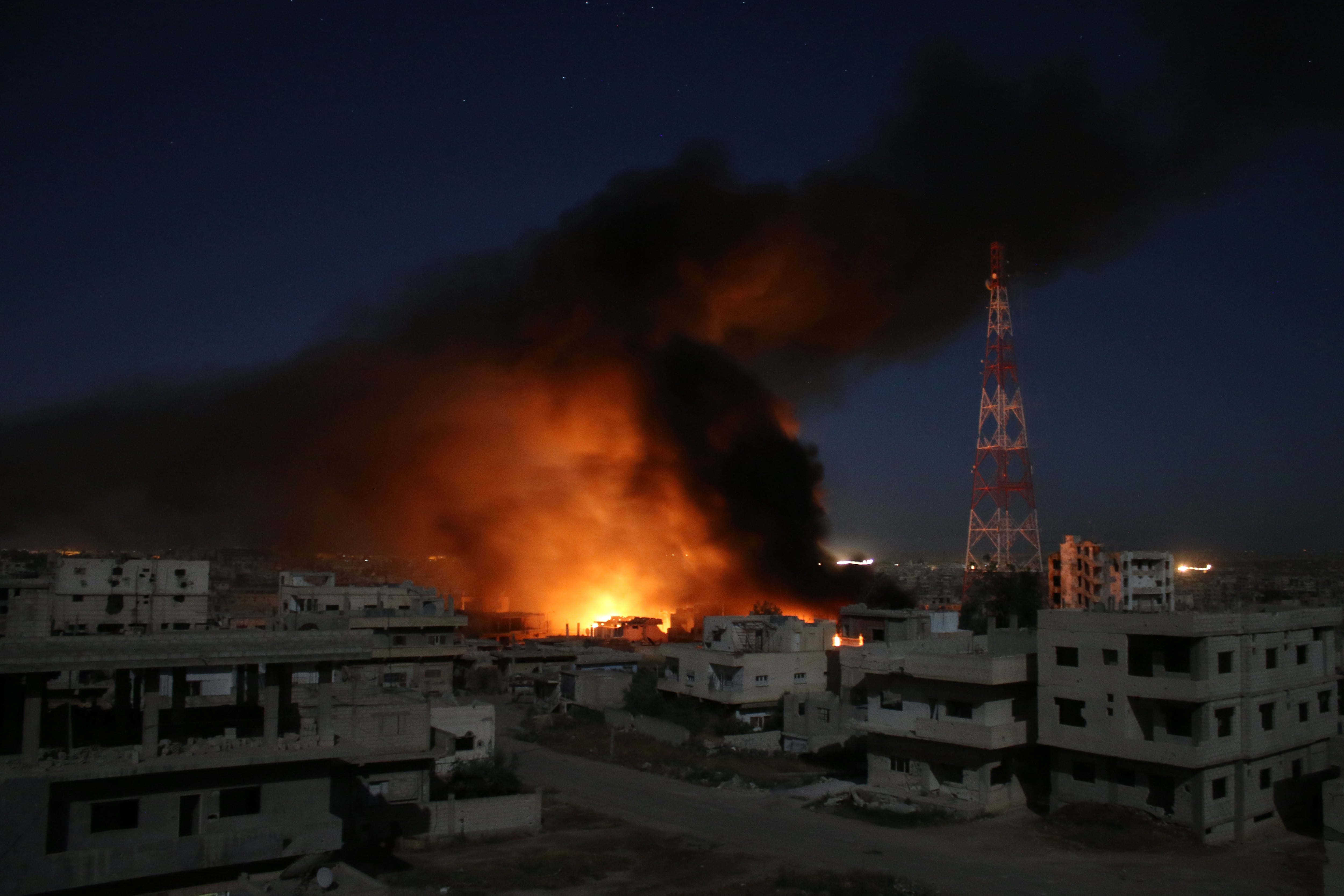BEIRUT — Russia's Ministry of Defense reported on Friday that pro-government forces circled around U.S. military advisers in eastern Syria to reach the Iraqi border, dealing what could be a major blow to the declared U.S. mission to defeat Islamic State militants in the desert region.
The development, if true, would mean Russian-backed pro-government forces have blocked the path of U.S.-backed opposition forces advancing north along the Iraqi-Syrian border, in the direction of the ISIS strongholds of Boukamal and Deir el-Zour, on the Euphrates River in eastern Syria.
The two forces have clashed regularly in the area, with U.S. aircraft twice striking Russian-backed forces the Pentagon said were threatening its local allies. The strikes are believed to have killed dozens of Syrian soldiers and Iranian-backed militia forces, in addition to destroying tanks and heavy weapons. On Thursday, the U.S. shot down an armed drone it said had attacked its units embedded with local opposition forces in the region.
By circling around them, the Russian-backed forces have apparently avoided a direct confrontation with U.S.-backed forces based out of al-Tanf, the border post under U.S. and opposition control.
They are advancing in the direction of Boukamal, according to Col. Gen, Sergei Surovikin, the commander of Russian forces in Syria.
On their side of the border, Iraqi forces, along with Iranian-backed Popular Mobilization Committee militias, are advancing through ISIS-held territory to meet the Russian-backed forces at the frontier, according to a Lebanese TV station close to the Syrian government.
The evening news broadcast on Al-Manar TV, which belongs to the Lebanese militant group Hezbollah, hailed the advance of the pro-government forces, and the Hezbollah fighters embedded with them.
The Britain-based Syrian Observatory for Human Rights monitoring group also reported the development, saying it was the first time government forces have reached the Iraqi border in over three years.
The United States Central Command said it "does not seek to fight the Syrian regime, Russian or pro-regime forces partnered with them," but promised to take "appropriate measures" to protect U.S. forces tasked with defeating the Islamic State group.
"As long as pro-regime forces are oriented toward Coalition and partnered forces the potential for conflict is escalated," CENTCOM said in a statement to The Associated Press.
"Coalition forces are oriented on ISIS in the Euphrates River Valley," the statement added, using a different acronym for the Islamic State group.
The U.N. children's agency warned Friday that the fight for IS's stronghold of Raqqa threatens more than 40,000 children, while overnight airstrikes on the city in northern Syria killed more than a dozen people.
The violence has displaced residents in and around the city, with about 80,000 children living in temporary shelters and camps, UNICEF said in a statement.
The U.S.-backed Syrian Democratic Forces launched an attack on Raqqa earlier this week and airstrikes by the U.S.-led coalition have intensified since then.

Smoke billows following a reported air strike on a rebel-held area in the southern Syrian city of Daraa early on June 9, 2018.
Photo Credit: Mohamad Abazeed/AFP via Getty Images
"An estimated 40,000 children remain trapped in extremely dangerous conditions in Raqqa. Many are caught in the crossfire," said UNICEF regional director Geert Cappelaere. He urged all parties to give safe passage to those who want to leave.
The Britain-based Syrian Observatory for Human Rights reported more than 25 overnight airstrikes on Raqqa killed 17 people, including 12 at an internet cafe. One of the dead was an activist with the group, it added.
In addition to the airstrikes, Raqqa was subjected to artillery and missile attacks, according to the activist collective known as Raqqa is Being Slaughtered Silently. It said the coalition used white phosphorous in the attacks.
In a video posted on its Aamaq news agency, ISIS also alleged the coalition used white phosphorous over Raqqa on Thursday at dusk, when Muslims would have been breaking their Ramadan fasts.
White phosphorous burns at extremely high temperatures and can be used to illuminate conflict zones or obscure them with smoke. International law prohibits its use in civilian areas because of its indiscriminate effects, from starting fires to causing excruciating burns for bystanders, according to Human Rights Watch, which said it was investigating the allegations.
The U.S. CENTCOM military command refused to comment on specific allegations but said it uses white phosphorous rounds "in accordance with the law of armed conflict ... in a way that fully considers the possible incidental effects on civilians and civilian structures."
Associated Press writers Vladimir Isachenkov in Moscow, Maamoun Youssef in Cairo, and Bassem Mroue in Beirut contributed to this report.




